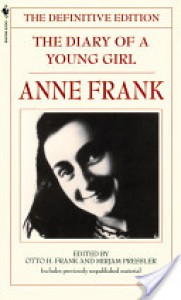"So it goes."
Ella Mc's book blog. Brand new 2018 - Only books read after 1st January 2018
The Diary of A Young Girl is exactly that and much more

I reread this for the Catch-up Book Club on Goodreads, and I'm glad I did. The last time I read Anne's diary I was younger than she was while writing it, and again, I'm annoyed at myself for being such a dumb kid. Also, it's changed since my initial read. There's more and we get more background in the newest editions.
I hate using stars to "rate" a journal that itself says how boring, juvenile, tawdry, silly and personal it is repeatedly, but I'm going to if only to keep the rating I gave it earlier and reinforce it.
As an older reader I felt for Anne's parents early in the book. She is oblivious to the many goings-on in preparation to go into hiding. She's living a child's life with her new birthday diary, while her parents have moved the family more than once to avoid Hitler only to get stuck in Holland. Nonetheless, they prepare for hiding by taking things piece by piece to the annex and preparing as much as possible before being forced to flee. I was impressed by her father Otto's ability to allow her as much carefree childhood as he could during what must have been incredibly terrifying days.
Anne's earliest entries show she's a child with a keen understanding that many people only show masks to the rest of us. This observation repeats itself through the journal, and her torment with others being less genuine than she would like is, in itself, heart wrenching. An historical document, a life in hiding with its mundanity and extraordinary qualities equally prevalent, this diary shows both extreme fear and incredible boredom. She goes from child to philosopher repeatedly.
Interested in a huge variety of things, Anne keeps herself busy writing not just in her diary but also short stories, genealogical studies, poetry, etc. She's got thoughts and ideals on feminism, love, God, war and peace, the culpability of regular people, families, self, discrimination, motherhood, pain, poverty, medical science, finance, the war machine, religion... This is not an idle idiot scrawling nonsense. She is very capable of growth, and we see it within the diary. She allows for her own earlier "childish" writing, yet leaves it included with some additional notes. While she was supposedly editing this for after the war, she remarks more than once that this diary is just for her, that it surely won't be worthwhile to anyone else ever. How wrong you were, Anne Frank.
Anne practices multiple languages, learns history and other subjects, reads voraciously and really only stops in to write in her diary occasionally once she and her family are in hiding. She also stays abreast of her schoolwork, always planning and even trying to expect freedom just around the corner. She's up on the war, keeps an eye on the Allied Forces and fully expects them to succeed. She knows she's being optimistic. She says she's doing it purposely. She watches the squabbles around her, getting annoyed at other people's annoyance, and only occasionally allows herself to wish for things she can't have. Instead, she simply plans for "after" the war.
One moment really stood out to me. While discussing the war, Anne notes that despite nationality, she believes that after the war "We can never be just Dutch or just English or whatever, we will be Jews as well." This is, to me, a remarkable statement. While Zionism had already begun, it becomes very clear that Anne - isolated and sheltered from the worst thus far - has figured out something absolutely vital about the world post WWII and about identity when someone is part of a marginalized group in a larger society. Much earlier she had started wrestling between her German identity and her Jewish identity and she will begin to include her Dutch identity too.
The Diary of A Young Girl is exactly that and so much more.
 4
4




